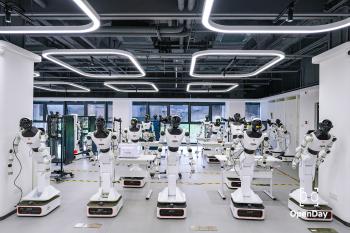Launch of the Quantum Secure Networks Partnership QSNP
16.05.2023 - More than forty partners from science and industry participate in a project funded by the EU with 25 million euros, launched on 1 March.
The topic of data security is becoming increasingly important in our ultra-modern society. Digital communications are an inextricable part of our professional and private lives: we share information – sometimes even internationally – using a wide range of devices and networks. Some of this data is highly sensitive and needs to be protected. The more powerful our computers become, the more robust the encryption processes used to protect our information need to be. Next-generation protocols based on quantum cryptography methods offer previously unattainable levels of data security. For example, quantum key distribution (QKD) technologies based on the fundamental principles of quantum mechanics are enabling tap-proof communications for the first time.
March 1st, 2023, has been the official launch of the Quantum Secure Networks Partnership, or QSNP, a new project in the area of quantum communications of the Quantum Flagship. Coordinated by Valerio Pruneri, an ICREA professor at ICFO, QSNP brings together more than forty partners from all over Europe, ranging from academia, foundries and RTOs, SMEs and spin-offs, to network and cryptography integrators and telecom operators. In the time span of three and a half years and with a budget of 25 million euros, these experts in the field of quantum technologies will seek to fulfil three main goals.
Firstly, they will develop advanced quantum technology for quantum secure communication networks against the ever-increasing power of computers and the sophistication of algorithms, even for quantum computers. That is, they will work on the development and deployment of next generation protocols based on quantum key distribution (QKD) cryptography techniques, that can help reduce the security assumptions needed for the networks, extend the range of secure communication, and search for new functionalities that could beyond these techniques.
Secondly, they will aim to integrate this innovative quantum cryptography technology not only at the component, system and network levels, but also into existing classical telecommunication systems and post-quantum protocols, assuring an additional layer of ultra-secure communications in this hybrid classical-quantum network.
Finally, they will apply all the know-how and capabilities acquired, as well as the technology developed, into different use cases, mainly into delivering critical European technology for government infrastructures such as the European Quantum Communications Infrastructure (EuroQCI). In doing so, they are interested in identifying the potential users, be it authentication, long-term secure storage, critical infrastructure protection, clock synchronization or primitives beyond QKD, in order to provide robust and solutions to their needs. In addition, the project will be a launchpad for future applications, to exploit new capabilities, evaluate new cost/effective features, measure use/integration easiness levels, and explore new sectors where quantum technologies could take over markets that are not being reached by the current technology.
Valerio Pruneri states: “We are thrilled to commence this innovative program. With QSNP, we are now moving out into the terrain where we will be able to develop further and most of all test the research development carried out in the first phase of the flagship. With the 40+ entities within this gran consortium, we expect to achieve unprecedented performances and new designs for application-specific cryptography, covering the full chain from quantum fundamental to product development.”
The ICFO-led project comprises 23 academic partners, five foundries and RTOs, seven spin-offs and SMEs, three network and crypto integrators, and four telecom operators.
Contact
ICFO – The Institute of Photonic Sciences
Mediterranean Technology Park, Av. Carl Friedrich Gauss, num. 3
08860 Castelldefels (Barcelona)
Spain
(+34) 93 553 40 02
Universität Paderborn
Warburger Str. 100
33098 Paderborn
Germany
+49 5251 60-0








